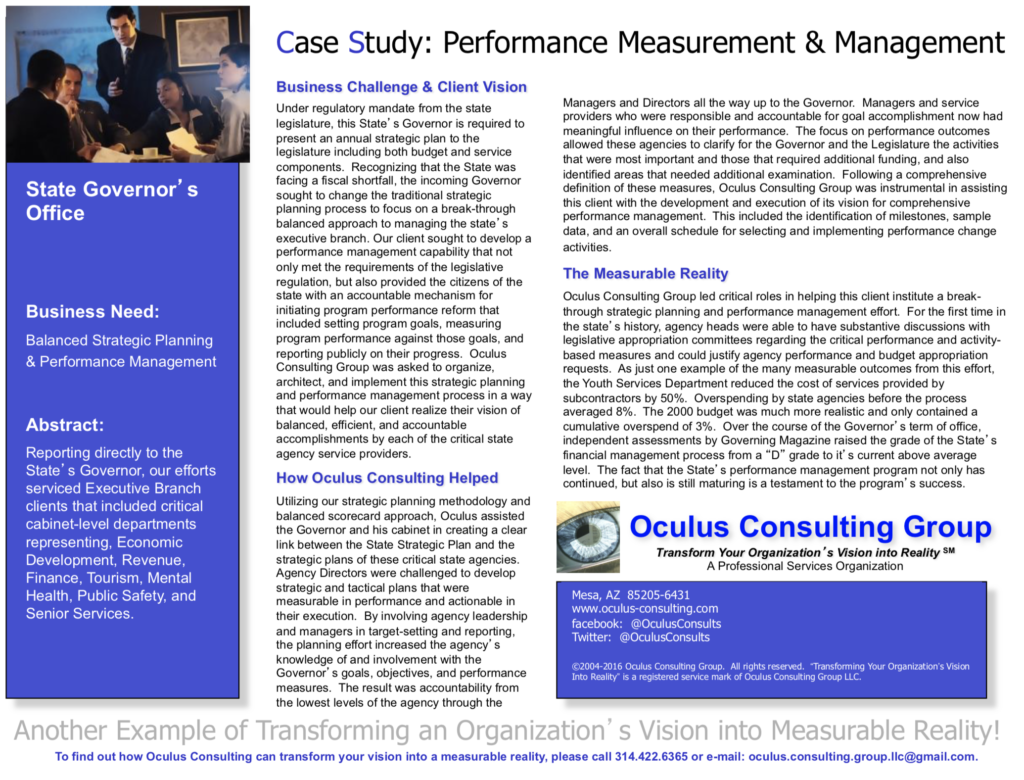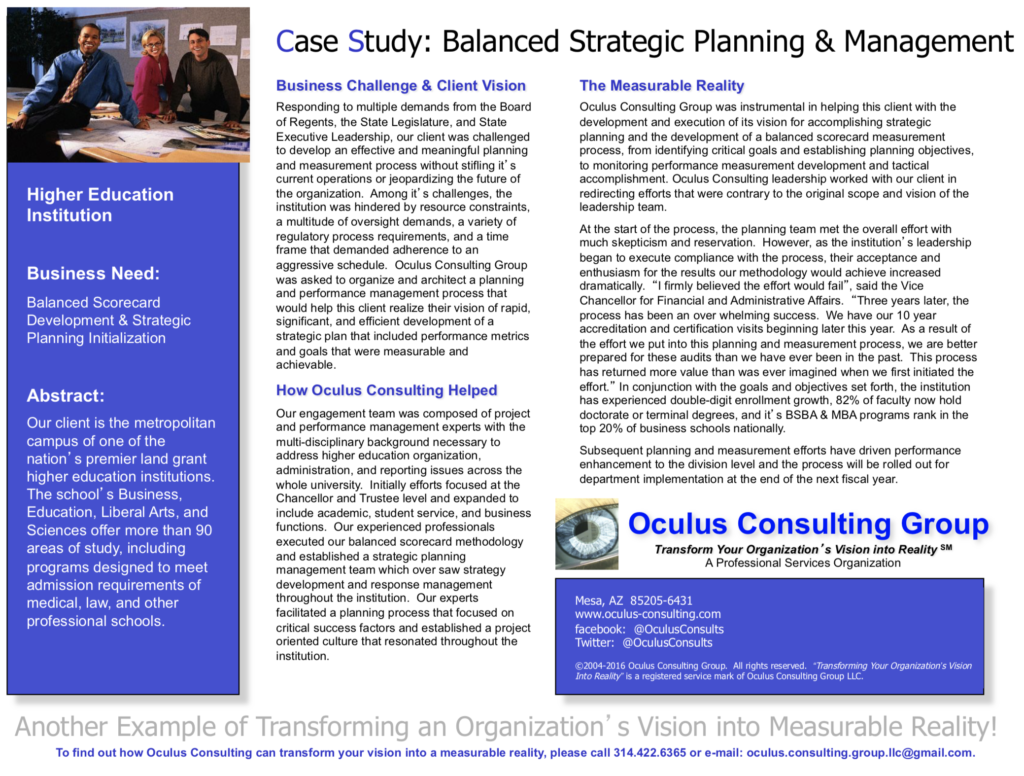Quick Look At Performance Measurement
The challenge for today’s leaders and organizational managers is to identify the key performance indicators and measures that are essential for today’s operations and tomorrows initiatives, to capture the data in a process that maintains it’s usefulness and integrity, and then to report and examine all the appropriate data for effective decision making.

By Oculus Consulting Group LLC
There is no argument that today’s organizations are operating in a complex and competitive environment. This environment requires that entities continually improve the quality and productivity of their products, services, employee initiatives, and most importantly that they stay ahead of the competition.
In assessing organizational challenges and executing projects aimed at enhancing your organization’s vision, many organizations quickly realize that they can only effectively improve that which they can effectively measure. For organizations to continually improve, they need a method to help them understand where they are now, help them plan where they want to go, and then help them understand when they have arrived at the vision destination. Hence, a critical element of the organizational recipe for success is the use of appropriate measures, measures that matter, and measuring what matters most. At Oculus Consulting Group, we have identified some key guidelines to be used in selecting the appropriate measures and measuring what matters initiate important benefits to an organization’s leaders and managers including:
“Can you imagine a football game between your two favorite collegiate football teams without someone keeping score, or worse, keeping track of yards and downs?”
Providing Focus, Direction, and a Common Understanding
Most organizational leaders would concur that the process of leading their organization to improve their operations is a difficult proposition if there is not a clear vision of where you are, or where you want to go. While vision and mission statements sound great and do a good job of providing overall guidance and direction, measuring what truly matters with appropriate measures can provide operational and organizational definitions that all employees can clearly understand.





Organizational Improvement Effectiveness
ow does your organization know if your organizational improvement projects or your process reengineering efforts are successful without the appropriate data and performance measures to demonstrate success? Can you imagine engaging in a diet or fitness routine without any way of knowing your rate or ultimate success? Can you imagine a football game between your two favorite college football teams without someone keeping score, or worse, keeping track of yards and downs? Organizational improvements require ongoing feedback, and in today’s mobile-centric business environment, immediate feedback to tell you where you are now and how well you are doing.
The challenge for today’s leaders and organizational managers is to identify the key performance indicators and measures that are essential for today’s operations and tomorrows initiatives, to capture the data in a process that maintains it’s usefulness and integrity, and then to report and examine all the appropriate data for effective decision making. Eliminating the inappropriate measures requires establishing effective guidelines and tools to ensure the measurement system is as effective as possible. At Oculus Consulting Group, we understand that the reengineering and performance measurement activities in your organization are just one attribute of an overall effective process. In reviewing our client’s success in process reengineering and performance measurement, we have compiled a “Top Ten” list of attributes that organizational measurement systems should use to ensure their process engineering and performance measurement will meet the organization’s effectiveness requirements.
1 – Information Rich Actionable Data
Information systems can generate loads of measurement data with apps, charts, and graphs that “wow” even the most astute users and investigators. Data reporting mechanisms that contain excessive data detail over long periods of time, or on too frequent a basis, can be too complicated for many executives, managers, and employees. The result is a distracted group of leaders comparing “their” data with each other and disputes regarding the relevance and importance of each data set. Visual trend data analysis provides more information-rich and actionable data.
2 – An Appropriate Blend of Efficiency and Effectiveness Indicators
Some organizations focus primarily on efficiency-oriented indicators (doing more faster) while other organizations are overly concerned with effectiveness-focused indicators (taking the time to do it right). Strategic performance measurement means developing and reviewing measures that account for both of these realms. Analyzing and reporting on any workgroup performance productivity are more valuable if they also include scrutiny of the quality of work being performed as well.
3 – Accomplishment Reward Oriented Measures
Many organizations like to focus on what’s not working right such as error rates, failure rates, complaints, or incomplete transactions. While these measures are important, effective performance measurement should include a balance of measurement categories that can demonstrate success, such as completions, satisfaction, and goal attainment or accomplishment.
4 – Measuring “X” Instead of “Y”
Simply selecting a group of performance metrics will not ensure that all appropriate measures will be tracked, or that improvements in one area can translate to performance enhancement elsewhere. Put simply, measuring the amount of time a customer service representative or agent spends on the phone with a customer doesn’t necessarily provide the required feedback to assess improved customer service.
5 – Easily Understood Measures
Not everyone in the organization understands the intricacies of the organization’s vocabulary, and worse, not all of the organization’s leadership has time to focus on this unique jargon. Effective performance measurement requires that the audience for the data be carefully considered. The measures don’t need to be complex but do need to specific and informative.
6 – Accountability for Accuracy
Effective process engineering and performance measurement require that the organization’s resources that are closest to the measurement activities be held accountable for the accuracy of the measurements. Incentive plans or productivity improvements can be influenced and manipulated to influence organizational goals and objectives. Care should be taken to ensure that the integrity of the measures is maintained.
7 – Accountability for Control
Some organizations hold workgroups accountable for performance measures that they do reflect the work that can be influenced. For example, organizations that attempt to hold student enrollment agents responsible for the incompleteness of student financial aid data will find that performance improvement or process reengineering initiatives lack the ability to control improvements in the performance of the metric.
8 – Timely Analytical Review
An effective performance measurement system may provide information in a concise, understandable, mobile-friendly, graphical format, but those responsible for the analysis of the information must also be timely and decisive in their review and action. Metrics that monitor critical functions like heart rhythms are more effective when they are monitored in real-time. For many organizations, the same analogy holds true as well. Metrics that indicate alarming trends, increasing problems, or declining service levels should be scrutinized and responded to immediately by the appropriate parties, regardless of when the next quarterly unit review will be held.
9 – Cost-Effective Collection
The value of the metrics being collected and reported should be weighed against the cost of designing, gathering, developing, collecting, summarizing, and distributing the information. If the costs to manage the performance measurement reporting metrics grossly outpace the effectiveness or event need for the information, the organization may need to revisit the purpose for the metric and its effectiveness.
10 – Compliance Versus Continuous Improvement
In the post-SOX and Dodd-Frank business environment, standards and requirements are clearly important, but effective performance measurement systems should also encourage the measurement and analysis of metrics that encourage and enhance continuous improvement. The differences can be as stark as a still photo versus a motion picture. While both could be visually appealing, one will be more effective in the long-term. Organizations often jeopardize the vision for the immediacy of ensuring control and compliance.
Concluding Thoughts
Data collected for process reengineering or performance measurement purposes can truly become a Pandora’s box for many organizations. Balancing the effectiveness, efficiency, reality, and appropriateness of the organization’s reporting initiatives can drive significant business benefits in terms of enhanced decision making, better services, improved quality, and improved financial performance. However, a focus on the glitz and glimmer of today’s mobile reporting environments can create a decision information device that also lacks the right data.
At Oculus Consulting Group, our expertise and assistance have helped organizations transform their vision for effective reengineering and performance measurement into a measurable reality of improved organizational effectiveness.
To learn how you can secure our services and assistance, please contact us.
© 2018-2021 Oculus Consulting Group LLC
Oculus Consulting Group LLC and “Transform Your Organization’s Vision into a Measurable Reality are registered service marks of Oculus Consulting Group LLC.

This Post Has One Comment
As a recent Ph.D. graduate in Industrial-Organizational Psychology, I agree wholeheartedly with the blog post. Proper performance measurement allows an organization to have the data it needs to make vital and important decisions. Data-driven decision making is one of the keys to success for any organization. Great post.